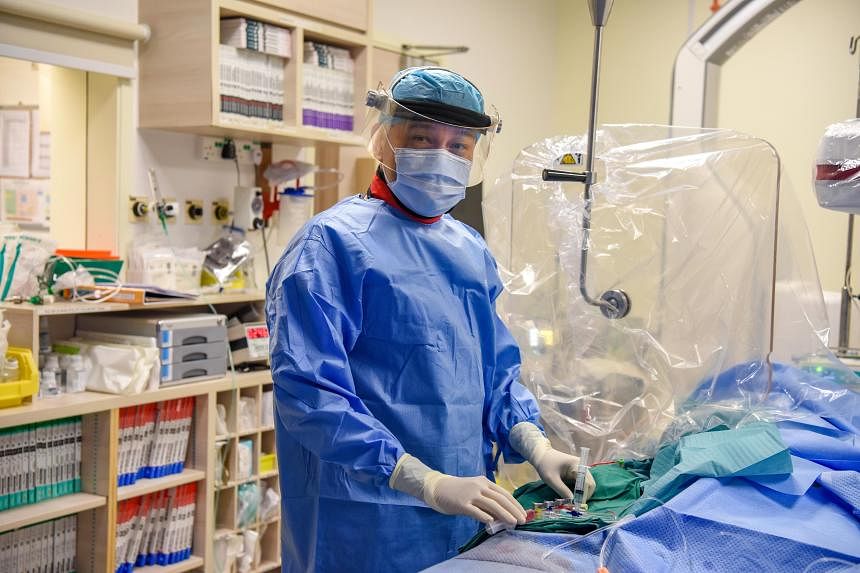SINGAPORE – Professor Tan Huay Cheem, who took home the National Outstanding Clinician Award on Thursday, has done more than a whopping 11,000 procedures as an interventional cardiologist treating patients with coronary artery disease, and continues to perform them very regularly.
At 60, the senior consultant at the National University Heart Centre, Singapore (NUHCS) still sees about 50 to 60 patients a day, three days a week, and is at the catheterisation lab doing procedures up to twice a week, with 24/7 call duty once a month.
“I still do calls (call duty) just because I feel that it is such a gratifying experience to be able to save people with heart attacks from a near life-threatening situation and get them back to health,” he said.
He has worked only at one hospital and never left the public sector, as emergency service is where he thrives.
It is where he is fulfilling his life purpose of saving people, which was ignited by his mother’s death.
It is a story he has previously shared with the media – how he, at 26, had returned home to find her collapsed in the bathroom.
He performed cardiopulmonary resuscitation on her but failed to save her from the sudden cardiac arrest, so he decided to focus on saving other people’s lives.
“So I continue to render my skills to those who really need it,” he said in an interview earlier this week.
“I feel that it’s important that I’m able to practise evidence-based medicine the way it should be, without consideration of other factors, like financial ones and so forth.”
It is not just the clinical work that landed him the award, but also his contribution in elevating the cardiology service here to world-class standards.
Among his achievements, he conceived the idea of a network that directs all patients with heart attacks to the National University Hospital for maximal salvage of damaged heart muscle.
“If you have a heart attack and are living in the western part of Singapore, when you call the ambulance, it will take you to NUH (National University Hospital)… because this is where the surgical backup… the best resources are,” said Prof Tan.
A year later in 2018, he conceived the idea of a cardiogenic shock centre to look after the sickest heart patients.
“We have not just the interventional cardiologists like myself doing the ballooning part, but also surgeons coming in to help put in the mechanical circulatory support system to support the heart.
“And we also have the intensivist,” he said, referring to intensive care physicians.
Under his leadership, NUHCS has held the record for the country’s shortest door-to-balloon time, highest volume of patients treated annually, and lowest mortality rate.
Six senior clinicians, geriatric care team lauded for medical excellence
Closer family doctor-specialist partnerships needed to tackle heart conditions: Ong Ye Kung
Prof Tan was the founding director of NUHCS and is now the senior adviser there, which leaves him more time for his passion of doing emergency ballooning and stent procedures for heart attack patients.
When he started the 24/7 emergency angioplasty service at NUH 22 years ago, he was on call every other day because there was only one other interventional cardiologist.
The longest he has gone on 24/7 calls was five days, and earlier, as a cardiology trainee, he worked for two years without a day off, he said.
His advice for aspiring interventional cardiologists: Be prepared to commit more than your time, continue learning and mentor.
“You sometimes work for hours, trying to open up their blocked arteries. You work yourselves so hard, you almost feel as though you are exchanging your patients’ life for yours.
“So, you have to have this compassion that will drive you,” he said.
“What you have learnt, what you have acquired, you pass on to the next generation… so that they don’t have to take so long (to hone their skills), they don’t have to commit so many mistakes.”
At 37, he had the arteries of an 80-year-old, needed multiple stents to keep his vessels open
One in 140 people in S'pore at risk of premature heart attack due to gene mutation
Join ST’s WhatsApp Channel and get the latest news and must-reads.
p.st_telegram_boilerplate:before {
display: inline-block;
content: ” “;
border-radius: 6px;
height: 6px;
width: 6px;
background-color: #12239a;
margin-left: 0px;
margin-right: 13px;
}
a.st_boilerplate {
font-family: “SelaneWebSTForty”, Georgia, “Times New Roman”, Times, serif;
}


